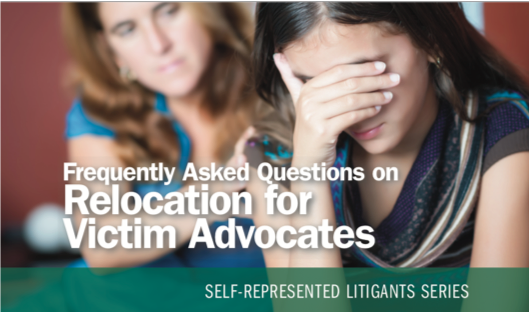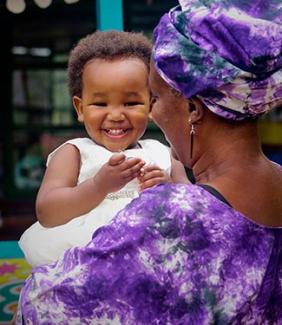By Patty Branco, National Resource Center on Domestic Violence (NRCDV)
“I am trying desperately to get back home to North Dakota before my abuser is released from jail. I am stranded in Louisiana. Please help me if in any way possible.” – Marie* (survivor reaching out to NRCDV)
Like Marie, survivors often reach out to NRCDV with inquiries about relocation assistance. In my role as a technical assistance provider, I often feel heartbroken over the challenges they face, and at the same time, inspired by the resilience and resourcefulness that they carry. While our organization does not provide direct services such as emergency shelter or crisis intervention, we do refer survivors to their local domestic violence program, state/territory coalition and the community-based resources best positioned to offer the support that they need. Although leaving is not an option for or the desire of every survivor – not to mention that ending the relationship does not necessarily end the abuse – many survivors do leave their abusive partners. Some survivors see relocating to a different city, county, state or country as the only option for finding support and safety from abuse.
 Relocation is certainly a broad and complex issue, with many important considerations. For example, there are legal implications that domestic violence survivors must consider when moving with children from one state or tribal jurisdiction to another. The Legal Resource Center on Violence Against Women and the Resource Center on Domestic Violence: Child Protection and Custody provide training and resources to help advocates and survivors navigate these legal issues (see Frequently Asked Questions on Relocation for Victim Advocates). While relocation may be the most viable option for a survivor to permanently cut ties with an abusive partner in some cases, it is critical that survivors receive strategic guidance to make informed choices when they need to relocate for their personal safety. Safety Net Project provides resources and consultation to better equip advocates and other professionals to address the complexity and challenges of ensuring survivors’ privacy and safety when they relocate (see, for instance, important considerations about identity protection and change).
Relocation is certainly a broad and complex issue, with many important considerations. For example, there are legal implications that domestic violence survivors must consider when moving with children from one state or tribal jurisdiction to another. The Legal Resource Center on Violence Against Women and the Resource Center on Domestic Violence: Child Protection and Custody provide training and resources to help advocates and survivors navigate these legal issues (see Frequently Asked Questions on Relocation for Victim Advocates). While relocation may be the most viable option for a survivor to permanently cut ties with an abusive partner in some cases, it is critical that survivors receive strategic guidance to make informed choices when they need to relocate for their personal safety. Safety Net Project provides resources and consultation to better equip advocates and other professionals to address the complexity and challenges of ensuring survivors’ privacy and safety when they relocate (see, for instance, important considerations about identity protection and change).
“I was wondering how I can apply for grants, so my children and I can relocate and get established elsewhere where we feel safe.” – Paula* (survivor reaching out to NRCDV)
Most of the time, when survivors reach out to NRCDV, they are seeking information about financial resources to make their relocation possible. They need money to fuel their car or buy a bus or plane ticket, to pay the security deposit on a new apartment, to support themselves until they find a job. The process of leaving and relocating can be particularly challenging for survivors who are socially or economically marginalized, including low-income survivors, those in isolated, rural areas, as well as immigrant survivors who may lack support networks. Available research has consistently identified poverty, economic dependence, and lack of tangible resources and social support as strong predictors of women’s decisions to return to, or remain with, their abusers. Additionally, studies have also found that women of color are at an “increased risk of encountering structural and social barriers that complicate help-seeking” for domestic violence (Crisafi & Jasinski, 2015, p. 1002).
Relocation funding may vary from state to state. In some states, the crime victim compensation program may cover relocation expenses for victims who must move for their physical safety, or a relocation assistance program for domestic violence victims may be available through the Department of Children and Families. In some instances, the cost of emergency relocation to a safer housing situation may also be offset by flexible funding – an emerging approach being used in many states across the country to address survivors’ housing needs (see How can I use funding from the Victims of Crime Act (VOCA) to address the housing needs of domestic violence survivors in my community?). It is important that survivors connect with their local domestic violence program and state/territory coalition for assistance with learning about and accessing available funding.
Partnering with Moving Companies as an Advocacy Strategy
Victim-defined advocacy must address the economic safety needs of survivors, including tangible economic resources. Creative and strategic community collaborations can create opportunities for supplementing traditional relocation funding and/or providing assistance when survivors do not qualify for these funding options. As one such strategy, this TAQ highlights examples of partnerships to provide free moving services to survivors.
“Just moved here. I have no family to assist me. I’m trying to get the money for a deposit and to hire someone to load and unload a truck for me to move out of this very dangerous situation.” – Kathy* (survivor reaching out to NRCDV)
We know that survivors leaving dangerous situations need a variety of things such as safety planning assistance, legal advocacy, affordable housing, adequate child care, job training and stable employment. As Kathy (quoted above) reminds us, they also need very tangible things like help packing their belongings and loading and unloading a truck. I first learned about free services designed to assist victims of domestic violence with their moving needs back in 2016, when I provided domestic violence training materials to Shelter Movers. A volunteer-based organization, Shelter Movers offers no-cost moving and storage services to domestic violence survivors and their children. The organization collaborates with community partners in Ottawa, Vancouver and Toronto to help families move out of abusive homes. According to their website, this “service model is highly replicable and requires very little overhead to operate, making its establishment in other communities across Canada very viable.”
SMT - a client's story from Mike Meehan on Vimeo.
In the United States, through partnerships with several domestic violence programs in California, Meathead Movers has been providing, for over 15 years, “premium moving services while extending a philanthropic arm to victims of domestic violence by giving them a fresh start with free moving services” (see California Moving Company Helps Victims of Domestic Violence Flee Their Abusers for Free). Similarly, the nation-wide moving company TWO MEN AND A TRUCK® has also established partnerships with local domestic violence programs such as Friendship Home in Lincoln, Nebraska. Whether it is moving survivors’ belongings from their previous home into storage while they are in shelter or moving them into a new home away from their abusive partners, TWO MEN AND A TRUCK® offers what Friendship Home staff describe as a “unique and invaluable confidential service” to survivors in their program. Julie Havener, Counselor and Strengths-Centered Advocacy Coordinator with Friendship Home explains:
“When survivors take the courageous step to reach out for help in finding safe shelter, there are already so many things they have to leave behind – the place they called home, their neighborhood, everything that was familiar to them. When it is safe to do so, our partnership with TWO MEN AND A TRUCK® allows survivors to keep their belongings rather than have to lose those too.”
Partnerships between moving companies and domestic violence programs are filled with potential. For many survivors, having access to free packing, moving and storage services may be their only viable option for safely relocating without losing their treasured belongings. For advocates, these partnerships represent an opportunity for expanding strategic collaborations with non-traditional partners to fill service gaps when resources are scarce. For moving companies and community members, such collaboration provides individuals and local businesses with a unique avenue for assisting survivors of domestic violence and getting actively involved in creating safer communities.
Considerations for Successful Partnerships
 Connecting survivors with free moving/relocation services may prove to be an invaluable component within a broader array of trauma-informed services that are offered to those fleeing abusive homes. However, it is critical that these services be provided in partnership with and under the guidance of domestic violence programs. Moving companies and volunteer movers need adequate training to ensure that the experience is as safe as possible for both survivors and volunteers, and that survivors are connected with the support they need beyond moving day. Within a trauma-informed approach, safety relates to survivors’ physical as well as emotional well-being, and services should be offered in an inclusive, welcoming, destigmatizing, and non-retraumatizing environment (NCDVTMH, 2011).
Connecting survivors with free moving/relocation services may prove to be an invaluable component within a broader array of trauma-informed services that are offered to those fleeing abusive homes. However, it is critical that these services be provided in partnership with and under the guidance of domestic violence programs. Moving companies and volunteer movers need adequate training to ensure that the experience is as safe as possible for both survivors and volunteers, and that survivors are connected with the support they need beyond moving day. Within a trauma-informed approach, safety relates to survivors’ physical as well as emotional well-being, and services should be offered in an inclusive, welcoming, destigmatizing, and non-retraumatizing environment (NCDVTMH, 2011).
When moving services are offered in partnership with domestic violence programs, victim advocates can play a key role in ensuring that services are delivered in a trauma-informed and empowering way. In addition to providing comprehensive training to volunteers, local domestic violence programs are also best positioned to screen requests for help, protect victims’ private information throughout the process and provide safety planning assistance before, during and after the move. “While leaving and relocating can be significant steps for women in changing the power dynamics of an abusive relationship, women are still in need of protection from their abusers and assistance from various informal and formal support systems following separation” (Crisafi & Jasinski, 2015, p. 989).
“I have been trying to find an agency that can help us to escape the area where we are not safe. I would like any information you can help me with regarding flight assistance.” –Renee* (survivor reaching out to NRCDV)
These considerations can also be applied to other creative collaborations that advocates may explore in order to address the breadth of survivors’ relocation needs, including but not limited to partnerships with hotels, rental car companies, rideshare services (see example of partnership with Lyft), as well as aviation charities that provide free air transportation to individuals and families in crisis (see, for example, Angel Flight West and Air Charity Network). Fortunately, resources are available to enhance advocates’ skills and mindset for successful collaborations and for engaging new or nontraditional partners. In developing and sustaining relationships with moving companies and other new partners, advocates must find and build common ground and a shared sense of purpose. And, often, this involves building bridges and making connections where none existed before.
*Survivor’s name has been changed to protect their safety and privacy.














